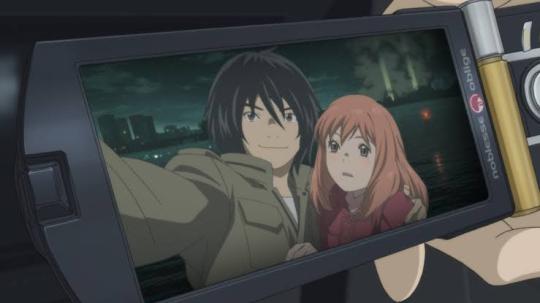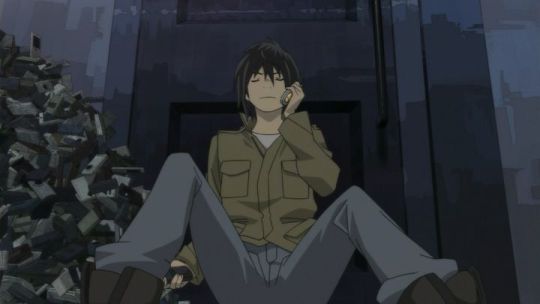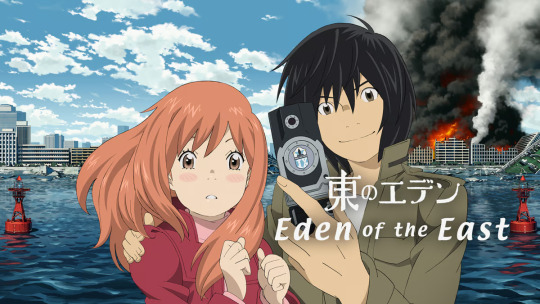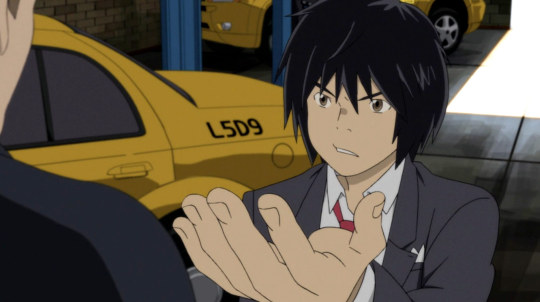#saki morimi
Explore tagged Tumblr posts
Text

Shout out to Eden of the East for being my introduction into anime.
#eden of the east#eden of the east anime#anime#akira takizawa#saki morimi#akira and saki#saki and akira#air king#noblesse oblige#intro to anime#my into to anime#I was not a kid who grew up on pokémon#I avoided anime for a long time#like a dingus#I finally gave in and watched Eden#I'm so glad I did#it's a really fun one#they're cute#the head tilt#that smile that damn smile
22 notes
·
View notes
Text
This anime is so underrated and unpopular, and I just don't know why? It's so good, it's an amazing anime. The story and the characters are so interesting. This anime is a treasure. Well I guess, less people know about this anime, makes more sense for it to be a treasure.

1 note
·
View note
Text

12 notes
·
View notes
Text
Eden of the East (1,3,4,5)

Eden of the East starts off with a bang, with our first intro to the main character Akira Takizawa being a scene where he wakes up naked in front of the White House holding a gun and a cell phone. We also meet another main character in this scene, Saki Morimi, who is getting questioned by the police for throwing a coin into the Presidential lawn.
What struck me about these first few episodes is how much the anime talks up the United States. Right from one of the first lines where Saki describes the White House as "the center of the world." She does this in plenty of other instances and makes it clear that she idolizes the US and its system.
In relation to the text I found this very interesting as it kind of implied the US was a land of opportunity. Saki describes how difficult it is to find a job, and despite this has already declined one because she felt they were taking advantage of her. This reflects what the text mentions about younger generations resisting the poor treatment older generations had to endure in work. In addition, I think Saki's idealization of the United States is a commentary on the current Japanese work culture. In the US, there is a sense of job mobility, where switching jobs is very common. In Japan, however, there is a concept of lifetime work. Once you pick a job, you do it until you retire or are forced out of it. Saki being so fascinated by the United States, even her picking it as her graduation gift is symbolic of the writers sentiments of wanting to switch to that system.
Akira's predicament is also representative of this sentiment. When Akira eventually learns what this phone in his hand and how it works, he learns he is part of some group called Seleçãos. Each Seleção is picked at random and tasked with "saving Japan," and given 10 billion yen to do so. If they refuse, they die. If they use the money on themselves, they die. If they become inactive and ignore the task, they die. Upon learning of these rules, Akira feels trapped, representative of how current Japanese work culture may make some workers feel. They are unable to get away despite being in a situation they do not want to be in. I also believe that the task assigned, "save Japan", is symbolic. The creator of the Seleçãos is implying that Japan has some major problem that must be solved, and, considering everything else I've discussed, it seems pretty clear that this problem lies in the work culture.
4 notes
·
View notes
Text
Kamiyama – Eden of the East (ep. 1,3,4,5)
The anime talks about a guy who appeared naked at the front of the White House in D.C. An unusual way to start anime, but I want to put the emphasis on the main thing, the relationship between Akira Takizawa and Saki Morimi. They met each other in a bizarre way. Everything in their relationship was pure coincidence. The fact that Akira and Saki are both from Japan and then they meet in Washington. And Saki willing to help to a homeless, crazy looking guy. But at the same time you feel that everything was setted up by Akira himself. For example, his passport and their matching birth dates.
As Akira becomes further entrenched in the lethal Seleção game, Saki is his lifeline. As other players are only concerned with winning, Akira's actions increasingly involve his connection with her. She reminds him that there is more to existence than survival or obeying artificially created rules. He offers her something she did not even realize she needed a human who totally believes in her. Their relationship is more than romantic; it's one of mutual support and development, even if they themselves don't know where they're going. In a world governed by secrets and manipulation, their relationship has a refreshingly honest quality to it. Despite the obstacles in their path, they choose to move forward together and that's what pulls us into their tale.

4 notes
·
View notes
Text
Blog Post - Eden of the East ᯓᡣ𐭩‧₊˚ ⊹
Erm... the naked man jumpscare right at the beginning of the first episode was not what I was expecting!!! Girlie was a little too chill about that... But jokes aside, I enjoyed Eden of the East! Even if it confused me a bit. The anime reminded me a bit of Future Diary and the manga Liar Game.
I see why Eden of the East was chosen to pair with our recent readings about Neoliberalism. Constantly, the main cast, like the protagonist Saki Morimi, is conflicted about finding a job as soon as possible (in other words, going through the shūshoku ritual) as the assumption they "are NEETs at heart" hovers over the younger generations of Japan. Saki seems to have an understanding sister and brother-in-law who will support her until she lands a job, but at the same time, it only perpetuates her feeling of becoming a NEET. To an extent, however, Saki accepts that as her fate. She's already been part of the Eden of the East club before graduation, and their goal is to support NEETs in Japanese society and eventually show how dependent older higher-ups are on the budding working class. Later on, the club gets supported financially by the other protagonist, Akira Takizawa (the aforementioned naked man) who seemingly lost all his memories of owning a phone with 8.2 billion yen in its name and a goal from a mystery corporation to "save Japan." And in the end, he did. Twice! The first time was before his memory wiping, as the 20,000 NEETs he assumed he killed in actuality helped evacuate Japanese citizens from a surprise missile strike. The second time was at the end of the series when he finally got Japan's generations to work together.
Eden of the East is an interesting showcase of the ideology of Neoliberalism, as the characters inside the anime demonstrate great potential as people but are held back from society by their unnecessary title as a NEET. (Hopefully, I interpreted that right).
Also, I liked the doggy :)

9 notes
·
View notes
Text
Eden of the East

Hey everyone! 🌟
This week, we dive into the first season of "Eden of the East" and explore some of its deeper themes, such as neoliberalism and NEETs. Let's see how these elements are delicately woven into the anime’s narrative.

Summary of the First Season
"Eden of the East" kicks off with an intriguing premise: Ten days after a missile strike hits Japan, 22-year-old Saki Morimi meets a young man in Washington D.C. He has no memory, is stark naked, and possesses a mysterious phone loaded with 8.2 billion yen in digital currency. The man, who adopts the name Akira Takizawa, discovers that he is part of a game involving 12 individuals (Seleçao) tasked with "saving" Japan using this fortune. As the story unfolds, Akira and Saki uncover the dark implications of this game and the societal issues it reflects.

Themes of Neoliberalism
Neoliberal Pressures
"Eden of the East" explores the theme of neoliberalism, which emphasizes free-market policies, deregulation, and reduction in government spending. We see these pressures reflected in how the Seleçao are expected to single-handedly save the nation using vast sums of money, echoing the neoliberal belief in individual responsibility over collective welfare.
Societal Impact
The game’s rules highlight the impact of neoliberal policies on society, showcasing how such systems can lead to social inequality and foster a survival-of-the-fittest mentality. This is evident in the way each Seleçao competes to impose their vision of a better Japan, often clashing with the common good.

The NEET Phenomenon
Who Are the NEETs?
NEETs—Not in Education, Employment, or Training—are individuals disengaged from traditional economic and educational structures. In "Eden of the East," NEETs are prominently featured as a marginalized group.
Akira’s Connection
Akira’s interactions with NEETs reveal his intent to integrate these outcasts into society’s improvement efforts. He recognizes their potential and creativity, challenging the stereotypical view of NEETs as unproductive. Through Akira’s journey, the anime critiques how society undervalues and overlooks such groups and the impact and change they can make.

Connecting Themes and Anime
"Eden of the East" masterfully incorporates these themes into its plot. The societal critique implied in the narrative invites viewers to reflect on the impacts of neoliberal policies and the struggles of NEETs. The anime challenges us to consider alternative approaches to societal problems, valuing collective action and inclusive policies over individualistic solutions.
By exploring these themes through engaging storytelling, "Eden of the East" offers both entertainment and a thought-provoking critique of modern societal issues.

Thanks for joining me on this exploration! What are your thoughts on neoliberalism and the portrayal of NEETs in "Eden of the East"? Let’s chat in the comments! 😊
3 notes
·
View notes
Text
Eden of the East: A Reflection on Modern Society
Anime has long been an artform that blends entertainment with topics that make you think and Eden of the East is no exception. Created by Kenji Kamiyama and released on Fuji TV in 2009, this anime masterfully intertwines action, adventure, mystery, and politics. More than just an intriguing story, it serves as a compelling social commentary on issues affecting Japan and the world as a whole.
The series opens with Saki Morimi, a young woman on her graduation trip to the United States. She stands before the White House attempting to toss a quarter into its fountain. Her seemingly innocent act attracts the attention of security officers, but before she gets into trouble, a mysterious, naked man appears—carrying only a gun and a cell phone.
This man, who has no memory of his past, soon discovers a collection of passports with different names in his apartment. He ultimately chooses to identify himself as Akira Takizawa, setting off on a journey to uncover his lost identity. Meanwhile, Saki, who had briefly crossed paths with him, seeks him out again to retrieve her misplaced wallet and passport, only to become further entangled in the mystery surrounding him.
Upon returning to Japan, Saki helps Akira find his home, which turns out to be an abandoned shopping mall or theater. There, Akira begins to piece together the puzzle of his past, uncovering more about his connection to a clandestine organization called Selecao.
As the story unfolds, we learn more about Saki as she faces the harsh realities of post-graduation life. She is part of a startup with her friends, working on a social media-like website called Eden of the East, while also job-hunting in hopes of securing a stable future. Her struggles reflect a universal challenge that many young graduates face – being denied a position based on lack of experience or how one views the world. This highlights the difficulties of standing out in an increasingly competitive workforce.

At its core, Eden of the East explores pressing social issues, particularly those faced by Japan. The series frequently references the term “NEETs” (Not in Education, Employment, or Training), drawing attention to the rising number of unemployed individuals. Through its narrative, the show challenges the audience to reflect on society's role in shaping the future.
A pivotal revelation in the series is Akira’s involvement in Selecao, a "game" orchestrated by an enigmatic figure known as "Mr. Outside." This program selects individuals deemed capable of "saving Japan," granting them the resources to make significant changes. This concept serves as a powerful metaphor for social and economic challenges, prompting viewers to consider how individuals, even those seemingly powerless, can make a difference.

Eden of the East is a captivating series that grips viewers from the very beginning. While Akira's mysterious past initially draws you in, the deeper themes of social responsibility and self-discovery make it stand out from the others. It not only entertains but also encourages reflection on how even the smallest actions can lead to meaningful change.
With 11 episodes, this anime is a short but engaging watch, followed by two sequel movies that further expand the story. If you’re looking for an anime that combines action, suspense, and thought-provoking themes, Eden of the East is a must-watch.
CherryBlossomCinephile Rating: 9.6/10
Animation: 10/10; Animators put a high amount of detail in their artwork giving 2D animation an almost 3D appearance. Items such as cell phones look incredibly close to their realistic counterparts and vehicles look computer generated despite the hand drawn animation.
Sound: 9/10; Soundtrack was phenomenal! Normally, I skip the opening and end credits that way I can jump right into the episode but the music invokes the exact emotions that I feel the creator was trying to express. The opening song is "Falling Down" by Oasis and being an Oasis fan myself, it instantly caught my attention.
Writing: 10/10; The story is captivating from the very beginning. This is an anime that cannot be taken for face value. It has the perfect mix of action, humor, mystery, and even more. The story telling was off the charts and I feel it would appeal to any audience

4 notes
·
View notes
Text
Media Analysis: Eden of the East (Eps. 1-5)
Just wanna start by saying how engaging this anime is. Every episode I watched just made me want to know what's next, and that opening with Oasis is amazing! Anyways, this gripping mystery starts with one of the 12 people selected in Japan, Akira Takizawa. Awoken with nothing on his person but a phone and a gun, Akira Takizawa eventually realizes he is part of some game, where there are 11 other "saviors", collectively known as Selecao. Each savior is given 10 billion yen and tasked to "save Japan." Whoever succeeds in saving Japan, depending on Mr. Outside's opinion (the mysterious entity behind the game) wins, and the other saviors will perish. The journey of Akira Takizawa brings in themes of labor expectations, unemployment, and the ever growing role technology has in human interaction.
The female lead character, Saki Morimi, represents young Japanese workers, who are forced to follow Japan's long business history of long-term employment and company loyalty. According to Mouer in Modern Japanese Culture, Japanese business culture usually expects a lifelong commitment from employees to businesses, usually coming at the cost of personal freedom. Saki's situation of not being able to secure a stable job right out of college shows how this model of business is slowly breaking down over the years, leaving many young Japanese without secure career paths. This leads to the trend of Japanese NEETS (Not in Education, Employment, or Training), whom are seen as those who reject these traditional work environments, leading to the refusal to be hired. In an effort to "save Japan", Akira possibly understood how NEETS may have been the root of economic downfall, leading him to kill 20,000 of them before he lost his memory.
Something I would also like to note is the relationship I see between the phone operator Juiz and AI. Back when this anime came out, there was no such thing as advanced AI as we have nowadays. The way Juiz is able to seamlessly fulfill Akira's requests, and all the other savors, is parallel to AI nowadays, where you can just ask AI for something, and how automation is increasingly replacing tradition human labor.
I'm looking forward to finishing this anime (including unassigned episodes) to see how it ends, and more over how this series as a whole picks at work culture.

4 notes
·
View notes
Text
Eden of the East (Episodes 1, 3-5)
Within ten seconds of opening up the first episode of Eden of the East, I was immediately hit with whiplash from Morimi's voice. Did you know that she voiced Yuzuki from A Place Further Than The Universe?

This anime is a little difficult to make sense of (and thus difficult to write about), but it's entirely intentional. Following a man who has erased his own memory, we initially understand nothing, but we follow Takizawa as he slowly learns about the situation he was placed in. The most fascinating aspect of this setup is that it allows for situations with double meanings, where the audience presumes an intuitive meaning initially. For example, the show draws attention to the phrase, "I pray you shall continue to be a savior" within the first few minutes of the first episode, and this important phrase is repeated on numerous other occasions. From my previous experience with secret agent/operative movies, I personally took the phrase to simply be something of a farewell that acknowledges that they are part of an organization with strong, heroic purpose.
Later, we learn that the twelve Seleção are all threatened with death as a punishment if they were to run out of money, reject the phone, or use the money primarily for personal gain. To make things worse, once a Seleção saves the country, the rest of them will immediately be killed. Given this new knowledge, the phrase begins to comes off as an ominous reminder of the fact that if the agent does not act according to the will of Mr. Outside or isn't lucky enough to become the savior, they will die. It becomes more of a "I hope you win the hunger games" kinda thing.
It's also worth mentioning that when Takizawa parts with the Seleção doctor, the doctor says to him, "I pray you shall be a savior." It is easy to miss, but the phrase he uses is actually different from the one analyzed above. The phrase that the doctor uses implies that they actually aren't saviors yet, and in the context of his imminent death, the phrase instead means "I hope you can manage to survive," which is sentimentally opposite to the original meaning.

Saki Morimi struggles with handling her friend, Osugi, who is determined to form a relationship with her. Though Morimi obviously does not like him back, she cannot bring herself to directly reject him. This proceeds to the extremes, as she not only hangs up on Osugi in the middle of conversation, but lies and states that she's staying the night with a mutual friend. This is understandable as it is difficult to hurt someone's feelings and potentially destabilize an entire friend group. However, given that she accepts his request to eat out together in episode 5, Morimi appears to potentially have the ulterior motive of keeping Osugi around as a backup, in case the relationship that she is primarily pursuing does not work out. Upon observation, the only situation in which Morimi accepts Osugi's advances coincides with the period during which she believes that Takizawa ditched and ignored her. Once Takizawa reconnects with Morimi, she does not show up at the restaurant with Osugi as she agreed to, and instead hangs out with Takizawa.
It kinda sucks, but what can you do? Not everyone can be the main character. Though I don't feel too bad for Osugi, as he seems to only truly care about himself. It's not too big of a theme as Morimi never personally took issue with it and Osugi's actions never resulted in anything significant, but as implied in the end of episode 5, Osugi was only there for Morimi so often since he expected that he would get into a relationship in return. This isn't necessarily a bad thing though, and it's common in the real world. It is natural to do nice things for someone you like (even if only for the sole sake of praise), and whether its good or bad likely depends on the true intent behind the action. All that aside, Osugi drew the attention of the lady with the blue hair at the very end. That man is cooked.
There are also obvious themes related to work culture throughout the episodes. In addition to the presence of NEETS (who were reintegrated into society with Takizawa's help), we follow Morimi as she continues to have trouble in finding a job. Though Morimi was accepted at a company she dreamed of working at, she declined the offer as she felt that the company only intended to use her. During Morimi's interview, we also get a glimpse into how employers view young people with displeasure and perceive them as lazy. This parallels a strong issue in recent society, which can be seen through the rise of the anti-work movement. In a world where you have to decide between feeling valued and getting the money necessary to survive, it can be difficult. In the context of the Seleção, we can also note that just having a desire to help people is not rewarded. Both the detective and the doctor, whose last words were both about how they really did try to help fix society, ended up dead.
I might add more or edit it to flow smoother later, as I really had to rush this one. I'll end this with some of my personal thoughts. I thought that Morimi's flip phone was pretty cool. The top part can rotate to landscape mode! Why DID that man in episode 1 give Takizawa his pants? I still don't know. Also, that guy Takizawa really needs to be more careful. I can't believe he let his phone get stolen so easily, among many other instances of recklessness. He's lucky that the phone needed fingerprint recognition. The detective's ID in exchange for his eight billion yen is NOT a good trade. Finally, it was so, so funny that it only cost 60 yen to get the prime minister to say 'uncle'. For a short while, I was worried that Takizawa had inadvertently spent four billion yen or something.
youtube
3 notes
·
View notes
Text
🍎 Eden of the East 🍎
Ep. 1, 3, 4, & 5
This anime is not something I would normally watch, and honestly, I find it a little hard to follow. The show just throws you into the plot with no build-up, background, and not much context. I'm a little out of my element. Nevertheless, it has been a pretty interesting watch so far, and I can sort of draw some connections to work culture as discussed in the reading. Akira Takiko is trying to discover who he is after his memory has been wiped, and he looks to his work to find identity. This turns out to be very harrowing, as he turns out to be a member of a vigilante-esque group tasked with “saving Japan” by any means necessary. This is juxtaposed by the other protagonist, Saki Morimi, who is a recent college graduate and not yet in the workforce. She meets Akira through a change encounter in Washington DC. Her character seems to be representative of the innocence of youth. While looking for her first job, she encounters a predatory company that masks its efforts to take advantage of young workers by painting the youth as drivers of innovation. This gives Akira a new drive and idea to "save Japan," but that was the end of episode 5, so we'll see where this goes. That's really all I've got right now. I'm looking forward to the rest of the episodes!!

2 notes
·
View notes
Text
Eden of the East Part I & Work Culture by Moure
This anime has a double storyline, one is how recent graduates like Saki Morimi are struggling to find stable employment due to the traditional thoughts and discrimination of society toward the younger generation, and the other portrays how a group of selected people (named Selecao) are provided with unlimited resources to save the country’s economic status. At the beginning of the anime, Saki says that Japan is a country that cannot run by itself, which means, politically interpreted, after WWII, Japan fell into the shadow of the US, which Japan relied on for many core elements including domestic social, political, or economic structure and, after years of development, cannot get rid of the influence of America. Corporate culture in Japan, for example, has become rigid due to such traditional structures, as Moure claimed in his article Work Culture. The company stands for traditions, but younger generations refuse to offer self-sacrifice for the company, which could lead to economic stagnation. Akira Takizawa, one of the chosen Selecao, despite his unlimited resources, still faces issues on how to fix Japan - that is, what does it mean to contribute to society? Here, the principle of capitalism, as money is considered the primary medium of value, is reflected through Mr. Outside’s game, where he wants to save Japan using his money, but whoever spends the money for their own wants will be eliminated. Additionally, various solutions appear to different Selecaos. Selecaos like Akira tend to limit the use of resources, as he only used ¥60 to make a difference by having the prime minister speak “I have nothing to say.” Other Selecaos, however, tend to use more radical approaches. The blue-haired female (no name yet) in the anime enjoys the approach of sacrificing other people’s lives. I still have a point to ponder: no Selecaos have ever asked Juiz directly to “help fix Japan.” I believe it is what the anime tries to convey that there is no simple solution to saving the country… Anyway, I look forward to the rest episodes to find out what is going to happen.

2 notes
·
View notes
Text
Eden of the East
Eden of the East is an anime that criticizes citizens of Japan that are out of work and living off their parent’s savings. These people are nicknamed NEETs, or Not in Education, Employment, or Training. Throughout the show we follow Saki Morimi going through her shuushoku (a process that seniors in college go through to look for regular salaried employment) and how she doesn’t enjoy the process. Saki isn’t a NEET but is attracted to Akira Takizawa’s mission of saving Japan through the NEETs.
The Selecao system is a metaphor for Japan’s government, mimicking how a select few are given immense power to save the country. Mr. Outside, the creator of the system, is revealed throughout the show to be an old, wealthy man. Mr. Outside helped build postwar Japan.
I had my first job at sixteen. My parents told me I had to get a job if I wanted to start saving up for college. I got hired at Dairy Queen and I worked at the ice cream part of the restaurant. I did not want a job at the time, though, so I took matters into my own hands and quit. In a way, I could have been classified as a NEET since I was only in mandatory high school but not employed or training. It was not until I was seventeen, almost eighteen, that I became a contributing factor to the economy.
In my head, I correlate NEETs from Eden of the East to Chihiro’s parents in Spirited Away. NEETs in Eden of the East seem to have an unlimited amount of money through their parents’ savings, and Chihiro’s parents represent an excess of wealth, but also greed.

2 notes
·
View notes
Text
Eden of the East
The Eden of the East is a 2009 anime series directed by Kenji Kamiyama. It blends elements of mystery, political intrigue, and action while addressing various societal and global issues.
The storyis about a guy named Akira Takizawa. He woke at the White House with no memory of who he is. He also has a gun and a phone and 8.2 billion yen. He is involved in a complex game involving a mysterious organization and people called the Selecao, who all have similar amounts of money and must decide how to use it to "save" Japan or cause its downfall. Takizawa doesn’t seem to be interested in power and instead becomes involved with a woman named Saki Morimi, who has her own personal struggles.
The anime addresses some Japanese issues like political corruption and the economic disillusionment of the younger Japanese generations. In the Selecao project, the individuals are given enormous power to influence the country’s future, can be seen as a commentary on the potential dangers of unchecked political power and the corruption that often comes with it. The show also has nationalistic undertones. It shows the struggle with the Japanese culture clashing with globalism. This is very pertinent to Japan because traditionally it has been very isolationist and conservative. It shows the contrast between Japanese culture and the influences of globalization.
In regards to global and general issues, The Eden of the East emphasizes heavily the theme of technology and its potential to either improve or destroy society. The digital money and the power it brings to the Selecao are symbolic of modern society’s increasing reliance on technology to manage wealth, power, and influence. This is a reflection of the growing role of digital currencies and the complex ethical dilemmas associated with technology today. The concept of using the power of the Selecao for either benevolent or harmful purposes mirrors debates about how to use financial power for the common good or personal gain on a global scale. At its core, The Eden of the East is about the ethical dilemmas that come with great power. It questions the role of individuals in shaping the world and the responsibility that comes with influence, something that’s very relevant to global politics, especially in the age of corporate monopolies and international power struggles. In my opinion, this anime has more serious undertones than the previous ones I've had to watch. I think everybody can relate to this because at some point in life most people struggle financially or may feel like they are lost in life.

2 notes
·
View notes
Text


Propaganda and summaries:
Erased: Erased is about a man who goes back in time (against his will) and has to stop a tragedy in order to escape the loop, usually at his own expense. When his mother is murdered in his apartment and he becomes the lead suspect, his power transports him to his childhood where he has to save 3 children from being murdered by the same person who killed his mom in the future, and find the murderer.
Eden: On November 22, 2010 ten missiles strike Japan. However, this unprecedented terrorist act, later to be known as "Careless Monday," does not result in any apparent victims, and is soon forgotten by almost everyone. Then, 3 months later... Saki Morimi is a young woman currently in the United States of America on her graduation trip. But just when she is in front of the White House, Washington DC, she gets into trouble, and only the unexpected intervention of one of her fellow countrymen saves her. However, this man, who introduces himself as Akira Takizawa, is a complete mystery. He appears to have lost his memory, is stark naked, except for the gun he holds in one hand, and the mobile phone he's holding in the other. A phone that is charged with 8,200,000,000 yen in digital cash.
#polls#anime#manga#erased#boku dake ga inai machi#eden of the east#best thriller anime and manga#best thriller anime and manga tournament
5 notes
·
View notes
Text
Eden of the East

This watch was quite unusual for me since I'm typically not into this sort of anime genre. I have to be honest, Eden of the East left me with mixed emotions and a strange aftertaste. The plot is certainly unique, which I appreciated, but the execution didn't quite resonate with me. Nonetheless, it ties into the themes we're discussing this week—work culture, neoliberalism, and social dropouts—which I'll dive into.
The anime immediately submerges us into a somber mood, depicting a broken social and work system that Saki Morimi strives to change and improve. The opening episode is set in the "center of the world," which funnily enough reveals to be Washington, D.C., symbolizing Japan's dependence on the United States and globalization. This theme is carefully integrated into the anime with references to pop culture such as Taxi Driver and Scarface.
One of the main themes Eden of the East explores is NEETs—Not in Education, Employment, or Training—who are labeled as societal "parasites." This term, not unique to Japanese society, reminds me of the Soviet Union's concept of "tuniadstvo," - literally social parasitism. Not having a job or a family was considered a crime, for which "social parasites" living off others' efforts were often prosecuted in a communist society. NEETs are often criticized, but the anime prompts us to ask why they ended up in this situation. Perhaps the very system that promotes individual responsibility for success is responsible for their exclusion. This idea is reflected when Saki, despite conforming to social norms and pursuing a corporate career, faces humiliation during a job interview. She could easily have become one of the many naked NEETs locked up in the mall. Saki was fortunate to have a support system and inner strength, which social dropouts may not have had access to. Salecao member presents a seemingly "easy" solution to eliminate NEETs through violence. However, Akira takes on a different approach, offering these individuals a second chance by acknowledging them, providing with guidance and work tasks. Rather than "getting rid" of the issue, he decides to reintegrate them back into a productive society.
Since this anime is rich in mysticism and surrealism, it's anything but a manual for solving real-world dilemmas. Nevertheless, it sheds light on socioeconomic struggles and remains an intriguing piece of art.
5 notes
·
View notes